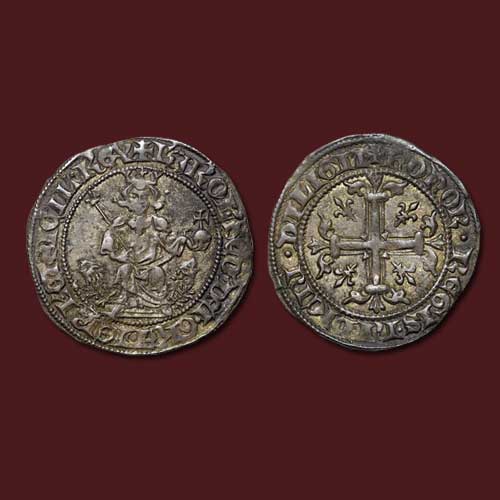Silver Gigliato Charles II of Anjou
2021-05-05 Wed
Charles II was king of Naples and ruler of numerous other territories, who concluded the war to regain Sicily, started by his father, Charles I. By making astute alliances and treaties, he greatly enlarged his dominions.After the uprising known as the Sicilian Vespers against Charles' father, the island of Sicily became an independent kingdom under the rule of Peter III of Aragon in 1282. A year later, his father made Charles regent in the mainland territories of the Regno (or the Kingdom of Naples). Charles held a general assembly where unpopular taxes were abolished and the liberties of the noblemen and clerics were confirmed.
Charles was considered an extremely pious man, closely allied with the church. Ruling over an enlightened court, he eliminated many of his father’s harsh measures. He is also noted for making Naples into something of a European capital by fostering trade and the arts, patronizing the university, and building monasteries and churches.
The Gigliato was a coin of pure silver established in 1303 by Charles II of Anjou in Naples, and then also in Provence from 1330. Its name derives from the Lilies ("Giglio") depicted on the reverse entwined around the cross. The coin weighed 4 grams. This type of coin was widely copied in the Eastern Mediterranean, especially by the Turks, such as the Emir of Saruhan.
Image Source: Wikipedia.org
Latest News
-
Ghiyath Shah as Heir Apparent
2025-09-25 ThuGhiyath Shah was the ruler of the Malwa Sultanate, reigning from 1456 to 1500. From 1456 to 1469, he...
-
Malwa Sultan Mahmud Shah Silver Coins
2025-09-11 ThuMalwa Sultan Mahmud Shah minted silver coins in round and square flans. <br><br> For round coins,...
-
Malwa Sultan Mahmud Shah Billon coin
2025-08-26 TueMalwa Sultan Mahmud Shah's billon coins followed three weight standards: 100 rati, 96 rati, and 80 r...
-
Fascinating Archaeological Facts on Postage Stamps - 91
2025-08-23 SatRhinoceros is one of the oldest land mammal species existing in India. There are five species of rhi...
-
Fascinating Archaeological Facts on Postage Stamps - 90
2025-08-23 SatUthiramerur, a Village in Kanchipuram, Tamil Nadu, is notable for its Temple inscriptions that descr...

